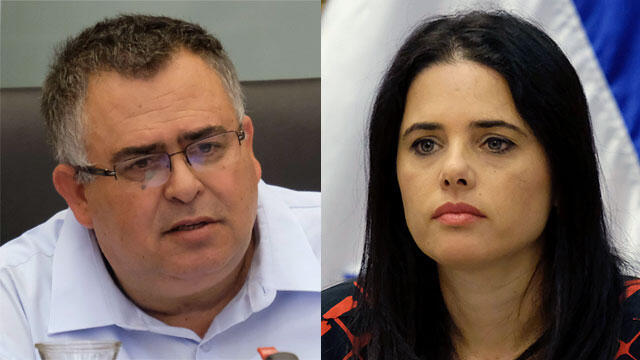Getting your Trinity Audio player ready...
Justice Minister Ayelet Shaked went toe-to-toe with coalition chairman MK David Bitan on Sunday over a legislation proposal that seeks to shield a sitting prime minister from police investigations .
Shaked (Bayit Yehudi) and Tourism Minister Yariv Levin (Likud) have decided not to raise private bill proposals by coalition members to a vote at the Ministerial Committee for Legislation because of disagreements within the coalition over the controversial bill. While the committee will still discuss the proposals, it will not vote on them.
"We haven't agreed on the wording (of the legislation), and we wish to discuss it within the (Bayit Yehudi) party," Shaked said. "The opinions are split in the party."
In response, Bitan threatened to cancel all of the committee's discussions on Sunday and not put any bills to a vote in the Knesset this week, the first week of the Knesset's winter session.
Opinions are split in Finance Minister Moshe Kahlon's Kulanu party as well, and they too asked for another week to hold consultations on the matter.
MK Rachel Azaria has already tweeted her position, saying "The legislation undermines the rule of law and puts the prime minister above the law. This bill sends a message to the public that corruption is legitimate. I will have a hard time supporting such a law."
Another controversial legislation that will not be put to a vote in the committee on Sunday is Bayit Yehudi's proposal to repeal the 2005 Disengagement Law in the northern Samaria .
Shielding the prime minister
The proposed legislation to shield the prime minister from police investigations would constitute an amendment to Israel’s Basic Law: The Government. The new bill stipulates that criminal investigations against a sitting prime minister cannot be conducted for corruption, fraud or breach of trust.
According to the framers of the bill, the aim is not intended to enable prime ministers to evade justice for wrongdoing, as it ensures that the time during which a prime minister serves is not included in the limitations period. This would still allow for investigation and possible prosecution after the prime minister’s term ends.
2 View gallery


MK David Amsalem, who proposed the bill, and Prime Minister Netanyahu
(צילום: מתוך עמוד הפייסבוק של ח"כ דוד אמסלם)
Following demands from coalition partners, Likud MK David Amsalem, who initiated the legislation, said Saturday the legislation would also include a term limit for the prime minister of two full consecutive terms (eight years).
"The prime minister of Israel holds one of the most complex jobs," the legislation proposal states. "He must make critical decisions on issues that affect the entire public, including making diplomatic, security, economic and social moves. Therefore, he must be entirely focused on those issues.
"In recent years, there have been several instances in which prime ministers were troubled by investigations against them over different offences, at times on matters that took place even before they began their term.
"To avoid this, we are proposing to determine that as a general rule, the prime minister will not be questioned under caution during his time in office. This principle would have two exceptions. Primarily, the prime minister could be investigated for offenses pertaining to security, violence, sex or drugs, which are particularly severe offenses. Second, the prime minister could be investigated for other offenses as well, on the condition that not holding the investigation during his term in office could cause significant security or economic damages."


